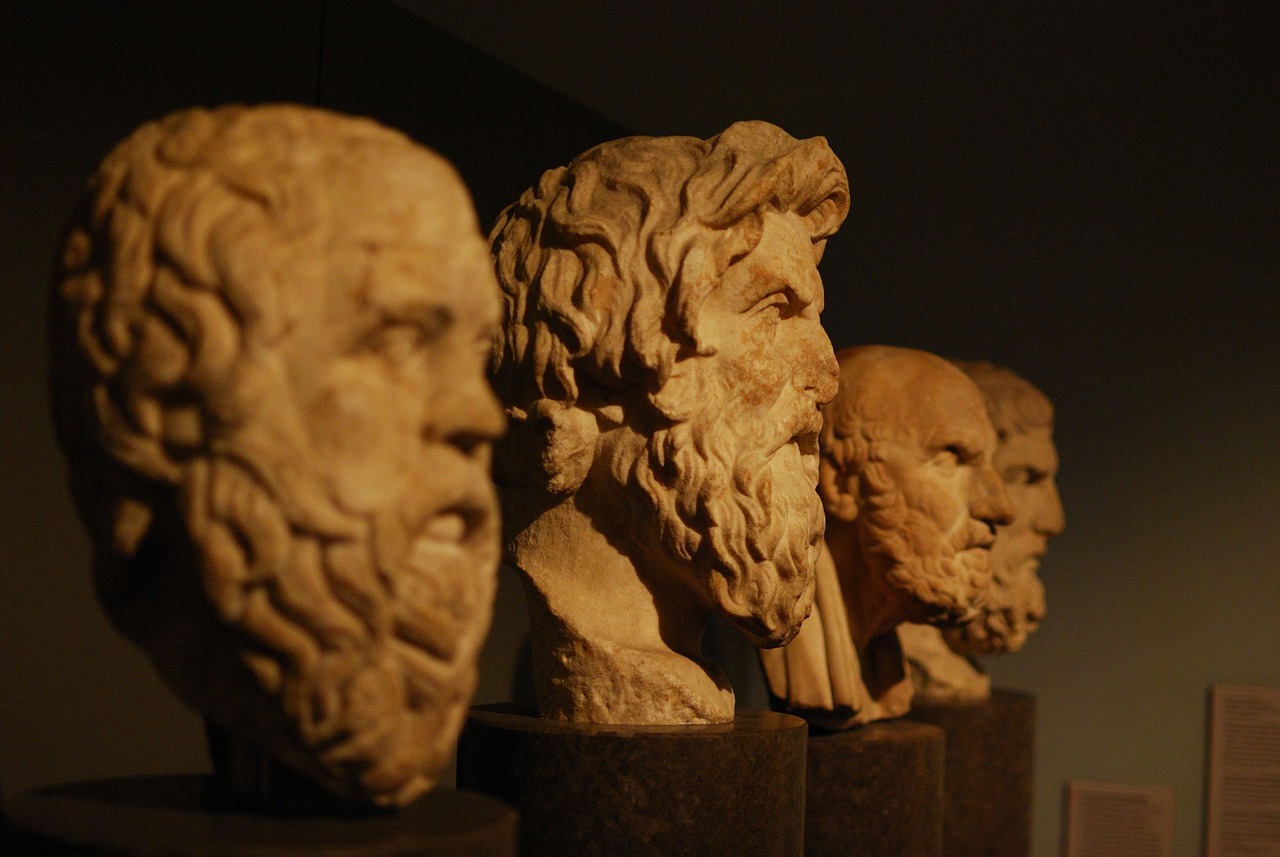The Philosophy of William James - An Analysis
William James, often hailed as the father of American psychology, was a philosopher whose ideas resonate with many of today's pressing questions about the human experience. His contributions to pragmatism and psychology not only shaped the landscape of philosophy in his time but also continue to influence modern thought. James had a unique ability to blend philosophical inquiry with psychological insight, making his work both profound and accessible. In this article, we will dive deep into the core tenets of his philosophy, exploring how his ideas about pragmatism, consciousness, free will, and religious experience remain relevant in today's world.
At the heart of William James' philosophy lies the concept of pragmatism. This approach emphasizes the practical consequences of beliefs and ideas, asserting that the truth of any concept is determined by its effectiveness in real-world applications. For James, pragmatism was not just a philosophical stance; it was a way of living. He famously posed the question, "What difference does it make?" when evaluating the validity of an idea. This perspective invites us to consider the implications of our beliefs on our actions and experiences. In a world often filled with abstract theories, James' pragmatism grounds us in reality, urging us to focus on what is useful and beneficial.
One of James' most influential contributions to psychology and literature is the concept of the stream of consciousness. He described consciousness as a continuous flow of thoughts, feelings, and perceptions, rather than a series of isolated events. This revolutionary idea transformed our understanding of human cognition, as it emphasized the fluid and dynamic nature of thought. Imagine your mind as a river, with ideas flowing in and out, sometimes overlapping, sometimes diverging. This metaphor captures the essence of James' view on consciousness, highlighting its complexity and richness. His insights paved the way for later developments in psychology and narrative techniques in literature, influencing writers like Virginia Woolf and James Joyce.
James' exploration of consciousness laid the groundwork for the development of functionalism in psychology, a theory that focuses on the purpose of mental processes rather than their structure. By emphasizing how consciousness helps individuals adapt to their environments, James shifted the focus of psychology from mere observation to understanding behavior in context. This functionalist approach has become a cornerstone of modern psychology, influencing therapeutic practices and educational methods. As we navigate our daily lives, James' insights remind us that our thoughts and feelings are not just abstract concepts but are deeply intertwined with our actions and interactions.
Another significant contribution from James is the James-Lange theory of emotion, which posits that our emotions arise from our physiological responses to stimuli. In other words, we don't cry because we're sad; we're sad because we cry. This idea was groundbreaking, as it shifted the understanding of emotions from being purely mental states to being linked to our bodily experiences. Imagine walking through a dark alley and feeling your heart race; according to James, that physiological response is what triggers the emotion of fear. This theory has had lasting implications in emotional psychology, influencing how we understand the connection between our bodies and our feelings.
James' theories have also found practical applications in therapeutic settings. His ideas inform modern psychological practices, particularly in cognitive-behavioral therapy and mindfulness approaches. By recognizing the interplay between thoughts, emotions, and behaviors, therapists can help clients develop healthier coping mechanisms. For instance, mindfulness practices encourage individuals to observe their thoughts and feelings without judgment, a concept that echoes James' emphasis on the fluidity of consciousness. This connection between philosophy and therapy illustrates how James' work continues to impact our understanding of mental health and well-being.
In his seminal work, The Varieties of Religious Experience, James explored the nature of faith and spirituality. He approached religion from a psychological standpoint, examining how personal experiences shape belief systems. His views on religious pluralism advocate for the acceptance of diverse spiritual paths, emphasizing that no single religion holds the monopoly on truth. This perspective encourages a more inclusive understanding of faith, recognizing the subjective nature of spiritual experiences. In a world increasingly marked by religious diversity, James' insights promote dialogue and understanding among different belief systems.
James was a staunch advocate for the concept of free will, arguing that it is essential for moral responsibility. He believed that our ability to choose is fundamental to our humanity, allowing us to shape our destinies. This notion challenges deterministic views that suggest our actions are preordained by biology or environment. Instead, James posited that we have the power to influence our lives through our choices. This belief in free will empowers individuals, fostering a sense of agency and responsibility in a world that often feels chaotic.
The implications of free will on ethics are profound and far-reaching. James' philosophy informs contemporary debates on moral responsibility and ethical decision-making. If we are truly free to make choices, then we must also bear the consequences of those choices. This perspective encourages individuals to engage in reflective thinking about their actions and their impact on others. The ethical landscape becomes richer and more complex when we acknowledge our capacity for choice, leading to deeper discussions about morality in society.
Despite his influential ideas, James faced critiques regarding his views on free will. Some philosophers argue that determinism undermines the very notion of free will, suggesting that our choices are merely the result of prior causes. These counterarguments have shaped the discourse around James' contributions, prompting further exploration of the relationship between free will and determinism. Engaging with these critiques allows us to appreciate the complexity of James' philosophy and its relevance in ongoing philosophical discussions.
- What is pragmatism? Pragmatism is a philosophical approach that evaluates theories or beliefs based on their practical consequences and applications.
- How did William James influence psychology? James laid the groundwork for functionalism and introduced concepts like the stream of consciousness, impacting both psychological theory and practice.
- What is the James-Lange theory of emotion? This theory posits that emotions are the result of physiological responses to stimuli, suggesting that we feel emotions based on our bodily reactions.
- How does James' philosophy relate to modern therapy? His ideas inform therapeutic practices like cognitive-behavioral therapy and mindfulness, emphasizing the connection between thoughts, feelings, and behaviors.
- What are the ethical implications of free will according to James? James argues that free will is essential for moral responsibility, suggesting that individuals must bear the consequences of their choices.

Pragmatism: The Core of James' Philosophy
When we dive into the world of William James, we find ourselves swimming in the rich waters of pragmatism. This philosophy isn't just a mere academic concept; it's a vibrant lens through which we can view our beliefs and their consequences. James defined pragmatism as a way of understanding the meaning of ideas based on their practical effects. In other words, if an idea works in real life, it holds value. This perspective leads us to a fascinating conclusion: truth isn't a static entity; it evolves based on our experiences and interactions with the world.
Imagine you're trying to solve a puzzle. You have a few pieces that seem to fit, but as you work through it, you realize that some pieces can be reshaped to fit better. This is how James viewed truth. He believed that our beliefs should be flexible and adaptable, much like those puzzle pieces, allowing us to adjust our understanding as we gather more information and experience. This approach challenges the traditional notion that truth is absolute and unchanging.
Furthermore, James' pragmatism has profound implications for how we approach various aspects of life, including science, religion, and ethics. For instance, in the realm of science, pragmatism encourages us to test theories and ideas in the real world, rather than relying solely on abstract reasoning. This leads to a more dynamic and evolving understanding of scientific principles. In terms of religion, James argued that the value of religious beliefs lies in their ability to provide meaning and comfort, rather than their adherence to dogma. This perspective promotes a sense of religious pluralism, where different beliefs can coexist and be evaluated based on their practical outcomes.
To summarize, the essence of James' pragmatism can be encapsulated in a few key points:
- Practical Consequences: Ideas should be evaluated based on their practical applications and outcomes.
- Dynamic Truth: Truth is not fixed; it evolves with our experiences and understanding.
- Religious Pluralism: The value of beliefs lies in their ability to provide meaning, not in their dogmatic adherence.
In essence, James' pragmatism invites us to engage with our beliefs actively, testing them against the backdrop of our lived experiences. It's a call to embrace a more fluid understanding of truth and meaning, urging us to consider the real-world implications of our ideas. This philosophy not only enriches our intellectual pursuits but also enhances our everyday lives, encouraging us to remain open-minded and adaptable in an ever-changing world.

The Stream of Consciousness
The concept of stream of consciousness is one of the most revolutionary ideas introduced by William James. Imagine your mind as a flowing river, where thoughts, feelings, and perceptions continuously ebb and flow. This metaphor captures the essence of James' view of human consciousness, which he described as a dynamic and ever-changing experience. Unlike traditional views that treated thoughts as discrete entities, James proposed that our mental life is a seamless flow, where one thought leads to another in a natural progression.
James believed that this continuous flow of thoughts reflects our lived experiences, emphasizing that consciousness is not just about isolated ideas but rather a rich tapestry of interconnected feelings and reflections. He argued that understanding this flow is crucial for grasping how we interpret the world around us. For instance, when you reminisce about a childhood memory, you might find your thoughts drifting to related experiences, emotions, and sensory details, all intertwined in a fluid narrative.
This idea had profound implications not only for psychology but also for literature. Writers like Virginia Woolf and James Joyce drew inspiration from James' concept, employing stream of consciousness techniques in their narratives to mirror the complexity of human thought. They sought to capture the essence of a character's inner life, allowing readers to experience the tumultuous and often chaotic nature of the mind. This literary style breaks away from traditional storytelling, inviting readers to engage with characters on a deeper, more personal level.
Moreover, James' insights into consciousness paved the way for modern psychological theories. By recognizing the fluid nature of thought, psychologists began to explore how our mental processes influence behavior, decision-making, and emotional responses. This shift in understanding has led to significant advancements in fields such as cognitive psychology and neuropsychology, where the focus is on how our thoughts shape our experiences and interactions.
In summary, William James' notion of the stream of consciousness revolutionized our understanding of the mind. It challenged conventional beliefs and opened new avenues for exploration in both psychology and literature. By viewing consciousness as a flowing river rather than a stagnant pool, James encouraged us to appreciate the complexity of our thoughts and the intricate ways they shape our reality.
- What is the stream of consciousness?
The stream of consciousness is a concept introduced by William James that describes the continuous flow of thoughts and feelings in the human mind. - How did William James influence literature?
James' ideas inspired writers to adopt stream of consciousness techniques, allowing them to depict characters' inner thoughts and emotions more authentically. - What impact did the stream of consciousness have on psychology?
His concept laid the groundwork for modern psychological theories, emphasizing the interconnectedness of thoughts and their influence on behavior.

stream of consciousness
This article explores the key concepts and contributions of William James, a pivotal figure in American philosophy, particularly in pragmatism and psychology, offering insights into his ideas and their relevance today.
Pragmatism is a central theme in James' work, emphasizing the practical consequences of beliefs. This section will discuss how James defined pragmatism and its implications for truth and meaning.
William James introduced the concept of to capture the ever-flowing, dynamic nature of human thought. Imagine your mind as a river, where thoughts, feelings, and perceptions continuously ebb and flow, merging and diverging in a beautiful yet chaotic dance. This metaphor encapsulates James' vision of consciousness—not as a static entity, but as a vibrant, ever-changing process. He argued that our thoughts are not isolated snapshots; instead, they are interconnected, creating a rich tapestry of mental experiences that define our existence.
James' notion of the stream of consciousness revolutionized both psychology and literature. In psychology, it paved the way for understanding how our thoughts connect and influence our behaviors. It suggested that to grasp the essence of human experience, one must consider the fluidity of thought rather than treating it as a series of discrete events. This perspective challenged traditional methods that focused solely on observable behaviors, urging psychologists to delve deeper into the subjective nature of experience.
James' ideas on consciousness laid the groundwork for functionalism in psychology, which emphasizes the purpose of mental processes in adapting to the environment. His emphasis on the practical implications of consciousness encouraged psychologists to explore how thoughts and feelings serve to help individuals navigate their lives. This shift in focus has had lasting implications, influencing various psychological theories and practices that prioritize understanding the mind's workings in a holistic manner.
The James-Lange theory posits that emotions result from physiological responses, suggesting that we feel emotions because our body reacts first. For instance, we don't cry because we are sad; rather, we feel sad because we cry. This groundbreaking idea has significantly impacted emotional psychology, reshaping our understanding of how feelings are intertwined with our bodily experiences. Today, this theory remains a cornerstone in discussions about the nature of emotions, highlighting the intricate connection between mind and body.
James' theories have practical applications in therapeutic settings, particularly in approaches like cognitive-behavioral therapy (CBT) and mindfulness. By recognizing the fluid nature of thoughts, therapists can help clients identify and reshape negative thought patterns. This process often involves encouraging individuals to observe their thoughts without judgment, fostering a greater awareness of their mental processes. Such practices not only empower clients to take control of their mental health but also align with James' vision of a dynamic, evolving consciousness.
In his work The Varieties of Religious Experience, James explored the nature of faith. This section will delve into his views on religious pluralism and the subjective nature of spiritual experiences.
James championed the concept of free will, arguing for its significance in moral responsibility. This section will analyze how his thoughts on free will challenge determinism and influence ethical discussions.
The implications of free will on ethics are profound. This subsection will explore how James' philosophy informs contemporary debates on moral responsibility and ethical decision-making.
James faced critiques regarding his views on free will. This part will summarize key counterarguments and discuss how they shaped the discourse around his philosophical contributions.
- What is the stream of consciousness?
The stream of consciousness is a literary and psychological concept that describes the continuous flow of thoughts and feelings in the human mind.
- How did William James influence psychology?
James' ideas laid the foundation for functionalism in psychology, emphasizing the importance of understanding mental processes in the context of their practical applications.
- What is the James-Lange theory of emotion?
The James-Lange theory suggests that emotions arise from physiological responses to stimuli, meaning we feel emotions because our body reacts first.
- How are James' theories applied in therapy?
James' theories inform therapeutic practices, particularly in cognitive-behavioral therapy and mindfulness, by focusing on the fluid nature of thoughts and emotions.

to describe the continuous flow of thoughts. This section will explore how this idea transformed psychology and literature, influencing modern understanding of human consciousness.
The concept of stream of consciousness introduced by William James is akin to a river flowing through the landscape of our minds. Just as a river is never the same at any two moments, our thoughts are in a constant state of flux, shifting and evolving with every experience. This metaphor captures the essence of how James viewed human consciousness—not as a series of disconnected thoughts but as a continuous, dynamic flow. Imagine standing on the bank of this river, watching the water rush by; each moment is unique, yet part of a larger, interconnected whole. This revolutionary idea not only transformed the field of psychology but also had a profound impact on literature, shaping how authors portrayed the inner workings of their characters' minds.
Before James, consciousness was often viewed through a more static lens, focusing on discrete thoughts and perceptions. However, his exploration into the stream of consciousness highlighted the fluidity of human thought processes. This perspective allowed psychologists and writers to appreciate the complexity of human experience, recognizing that our thoughts are often a blend of memories, feelings, and sensory perceptions. For instance, when we recall a childhood memory, it might evoke a scent, a sound, or even a fleeting emotion—all intertwining in a seamless narrative. This understanding paved the way for modern psychology to delve deeper into cognitive processes and the intricacies of mental states.
In literature, the stream of consciousness technique became a powerful tool for authors seeking to depict the inner lives of their characters more authentically. Writers like Virginia Woolf and James Joyce embraced this style, creating narratives that mirrored the chaotic yet beautiful nature of human thought. Their works often present a tapestry of thoughts, feelings, and sensory experiences, inviting readers to immerse themselves in the characters' minds. This narrative technique allows for a richer exploration of themes such as identity, memory, and perception, making the reading experience more intimate and engaging.
Moreover, the implications of James' concept extend beyond psychology and literature. In our daily lives, we can observe the stream of consciousness in action—whether it’s during a moment of reflection, a daydream, or even in the flow of conversation. Understanding that our thoughts are not isolated events but part of a continuous flow can help us cultivate greater awareness of our mental processes. This awareness can lead to improved emotional regulation and mindfulness, as we learn to navigate the currents of our thoughts rather than feeling overwhelmed by them.
In conclusion, William James' idea of the stream of consciousness has reshaped our understanding of both psychology and literature. By recognizing the continuous flow of thoughts, we gain valuable insights into the nature of human consciousness, allowing us to appreciate the intricate web of experiences that shape our identities. This concept not only provides a framework for psychological inquiry but also enriches our literary landscape, inviting us to explore the depths of the human experience.
- What is the stream of consciousness?
It is a narrative technique and psychological concept that describes the continuous flow of thoughts and feelings in the human mind, as introduced by William James.
- How did the stream of consciousness influence psychology?
It shifted the focus from discrete thoughts to a more holistic understanding of mental processes, paving the way for modern psychological theories.
- Which authors used the stream of consciousness technique?
Prominent authors such as Virginia Woolf and James Joyce utilized this technique to create deeper, more immersive narratives.
- Can understanding the stream of consciousness improve mindfulness?
Yes, by recognizing the fluid nature of our thoughts, we can cultivate greater awareness and emotional regulation.

Influence on Psychology
William James' contributions to psychology are nothing short of revolutionary. His emphasis on the stream of consciousness not only reshaped how we understand human thought processes but also laid the groundwork for the development of various psychological theories. Imagine for a moment the mind as a flowing river, with thoughts, emotions, and memories swirling together. James captured this dynamic essence, arguing that consciousness is not a series of isolated events but a continuous flow, deeply influenced by our experiences and environment.
One of the most significant impacts of James’ work is his influence on the emergence of functionalism in psychology. This approach focuses on the purpose of mental processes and behaviors rather than merely their structure. Functionalism posits that mental states are defined by their function in the organism's life, which was a stark contrast to the then-dominant structuralism. James believed that to truly understand the mind, one must consider how thoughts and feelings help us adapt to our surroundings. His perspective encouraged psychologists to explore the practical applications of psychological research, paving the way for modern psychology's focus on real-world implications.
Moreover, James' ideas have been instrumental in shaping contemporary therapeutic practices. For instance, his belief in the importance of personal experience and subjective reality resonates deeply with modern approaches to therapy, such as cognitive-behavioral therapy (CBT) and mindfulness. These methodologies emphasize the individual's perspective and the role of thoughts in shaping emotions and behaviors. By integrating James' insights, therapists are better equipped to help clients navigate their feelings and foster a more profound sense of self-awareness.
To further illustrate the influence of James on psychology, consider the following table that highlights key concepts introduced by him and their relevance in modern psychology:
| Concept | Description | Modern Relevance |
|---|---|---|
| Stream of Consciousness | A continuous flow of thoughts and feelings. | Influences narrative techniques in literature and psychological understanding of thought processes. |
| Functionalism | Focus on mental processes' functions rather than their structure. | Foundational for applied psychology and behavior analysis. |
| Pragmatism | Truth is determined by practical consequences. | Guides therapeutic approaches by emphasizing outcomes over absolutes. |
In summary, William James' influence on psychology is profound and far-reaching. His innovative ideas not only transformed the field during his time but continue to resonate with modern psychological practices. By advocating for a more holistic understanding of consciousness and emphasizing the significance of individual experience, James has left an indelible mark on the discipline, encouraging a more empathetic and practical approach to mental health.
- What is the stream of consciousness? The stream of consciousness is a concept introduced by William James to describe the continuous flow of thoughts, feelings, and perceptions in the human mind.
- How did William James influence psychology? James influenced psychology by introducing functionalism, emphasizing the practical applications of mental processes, and advocating for the importance of personal experience in understanding human behavior.
- What are the practical applications of James' theories? James' theories inform modern therapeutic practices such as cognitive-behavioral therapy and mindfulness, focusing on individual experiences and the role of thoughts in shaping emotions.

James-Lange Theory of Emotion
The is one of those groundbreaking ideas that flips our understanding of feelings on its head. Imagine this: instead of emotions being the primary response to an event, they are actually the result of our body's physiological reactions. In simpler terms, we don't cry because we're sad; rather, we feel sad because we cry. This perspective was revolutionary when William James proposed it in the late 19th century, and it continues to resonate in modern psychological discussions.
To break it down further, the theory suggests that when we encounter a stimulus, our body responds first, and then we interpret these bodily changes as emotions. For example, if you see a bear while hiking, your heart races, your palms sweat, and you might even tremble. According to the James-Lange Theory, it's not the fear of the bear that causes these reactions; instead, it's the physiological response that leads to the feeling of fear. This idea challenges the traditional notion that emotions drive our physiological responses and opens up a new way of understanding how we experience feelings.
James' theory can be summarized in a straightforward way:
| Stimulus | Physiological Response | Emotion |
|---|---|---|
| Seeing a bear | Increased heart rate, sweating | Fear |
| Receiving good news | Smiling, relaxed posture | Happiness |
This theory has profound implications for understanding emotional psychology. It suggests that our emotions are not as straightforward as we might think. They are intricately linked to our physical state, creating a feedback loop that can influence our mental health. For instance, if someone is feeling down, engaging in physical activity can trigger physiological changes that might lead to a more positive emotional state. This connection between body and mind is a cornerstone of many contemporary therapeutic practices.
Moreover, the James-Lange Theory paved the way for further exploration into the physiological basis of emotions. Researchers have since delved into how different emotions manifest physically, leading to a richer understanding of emotional responses. This has implications not just in psychology but also in fields like neuroscience, where scientists study how brain activity correlates with our emotional states.
In conclusion, the James-Lange Theory of Emotion remains a vital part of our understanding of how we experience feelings. By recognizing that our emotions are deeply rooted in our physiological responses, we gain insights that can help us manage our emotional well-being more effectively. It's a fascinating interplay between mind and body that continues to inspire both research and practical applications in psychology.
- What is the James-Lange Theory of Emotion?
The James-Lange Theory posits that emotions are the result of physiological reactions to events, meaning we feel emotions after our bodies respond.
- How does the James-Lange Theory differ from other theories of emotion?
Unlike other theories that suggest emotions precede physiological responses, the James-Lange Theory claims that our physical reactions lead to emotional experiences.
- What are the practical implications of this theory?
This theory suggests that modifying our physical state can influence our emotional well-being, making it relevant in therapeutic practices like cognitive-behavioral therapy.

Practical Applications in Therapy
William James' philosophical insights have far-reaching implications, particularly in the realm of therapy. His emphasis on the pragmatic approach to understanding human behavior and emotions has paved the way for various therapeutic practices that prioritize real-world applications over abstract theories. For instance, his ideas resonate strongly in cognitive-behavioral therapy (CBT), where the focus is on how thoughts influence emotions and behaviors. By recognizing the fluidity of consciousness, therapists can help clients identify and challenge negative thought patterns, leading to healthier emotional responses.
Moreover, James' concept of the stream of consciousness emphasizes the importance of being present and aware of one's thoughts. This awareness is a cornerstone of modern mindfulness practices, which have gained tremendous popularity in therapeutic settings. Mindfulness encourages individuals to observe their thoughts without judgment, fostering a sense of acceptance and reducing anxiety. Therapists often integrate mindfulness techniques into their sessions, allowing clients to develop a deeper understanding of their emotional states and cultivate resilience.
In addition to CBT and mindfulness, James' ideas also influence the use of narrative therapy. This approach allows clients to reframe their life stories, enabling them to see challenges from different perspectives. By understanding their experiences as part of a larger narrative, individuals can find meaning and purpose, which aligns with James' belief in the subjective nature of reality. This therapeutic technique empowers clients to take ownership of their stories, fostering a sense of agency and control over their lives.
To illustrate the practical applications of James' theories in therapy, consider the following table summarizing key therapeutic approaches influenced by his philosophy:
| Therapeutic Approach | Influence of James' Philosophy |
|---|---|
| Cognitive-Behavioral Therapy (CBT) | Focus on the relationship between thoughts, emotions, and behaviors. |
| Mindfulness | Emphasis on present-moment awareness and acceptance of thoughts. |
| Narrative Therapy | Encourages clients to reframe their life stories for empowerment. |
In summary, William James' contributions to psychology and philosophy have laid the groundwork for various therapeutic practices that emphasize practical outcomes and personal agency. By integrating his ideas into therapy, practitioners can offer clients tools to navigate their emotional landscapes more effectively, ultimately leading to improved mental health and well-being.
- What is the main focus of William James' philosophy?
William James primarily focused on pragmatism, emphasizing the practical consequences of beliefs and the importance of personal experience in understanding truth.
- How did James influence modern psychology?
James introduced concepts such as the stream of consciousness and the James-Lange theory of emotion, which have significantly shaped modern psychological theories and practices.
- What therapeutic approaches are influenced by James' work?
Key therapeutic approaches influenced by James include cognitive-behavioral therapy, mindfulness practices, and narrative therapy.

Religious Experience and Pluralism
William James' exploration of religious experience in his seminal work, The Varieties of Religious Experience, is nothing short of groundbreaking. He approached religion not merely as a set of doctrines or institutional practices but as a profound and deeply personal experience that varies widely among individuals. This nuanced perspective allows us to appreciate the rich tapestry of spiritual life, where each person's experience is unique and valid. James argued that religious experiences are not confined to any single tradition; instead, they encompass a multitude of beliefs and practices, reflecting the diverse ways humans seek meaning and connection with the divine.
At the heart of James' philosophy is the concept of pluralism. He posited that no single religious framework holds a monopoly on truth. Instead, he embraced the idea that multiple religions can coexist, each offering valuable insights into the human condition. This perspective is crucial, especially in our increasingly globalized world, where interactions between different faiths are more common than ever. James believed that recognizing the validity of diverse religious experiences can lead to a greater understanding and tolerance among people of varying beliefs.
James categorized religious experiences into two main types: the ineffable and the noetic. Ineffable experiences are those that cannot be fully articulated; they are deeply felt and often transcend ordinary understanding. Noetic experiences, on the other hand, provide profound insights or knowledge about the nature of reality. These categories highlight the complexity of spiritual experiences and underscore the importance of personal interpretation in understanding religious phenomena.
One of the most compelling aspects of James' work is his emphasis on the subjective nature of religious experiences. He argued that what matters most is not the objective truth of a belief system but the impact it has on the individual's life. This leads to a fascinating question: If a person's faith brings them peace, purpose, and a sense of belonging, does it truly matter whether their beliefs align with traditional doctrines? James would likely argue that the answer is no. The transformative power of faith lies in its ability to shape our experiences and guide our actions.
To further illustrate James' ideas, consider the following table that contrasts his views on religious experience with traditional dogmatic approaches:
| Aspect | William James' Perspective | Traditional Dogmatic Approach |
|---|---|---|
| Nature of Truth | Subjective and pluralistic | Objective and absolute |
| Role of Experience | Central to understanding faith | Secondary to doctrine |
| Religious Validity | Multiple valid paths | One true path |
| Impact on Life | Transformative and personal | Prescriptive and collective |
James' approach encourages an open dialogue about faith, allowing individuals to share their experiences without fear of judgment. This is particularly relevant in today's world, where interfaith dialogue is essential for fostering understanding and cooperation among diverse communities. By embracing pluralism, we can create a more inclusive society that values the richness of different spiritual journeys.
In conclusion, William James' insights into religious experience and pluralism challenge us to rethink our assumptions about faith. By recognizing the validity of diverse beliefs and the subjective nature of spiritual experiences, we can foster a greater appreciation for the myriad ways in which people seek meaning and connection in their lives. His work remains a vital contribution to the ongoing conversation about the role of religion in our increasingly interconnected world.
- What is the main idea behind William James' view on religious experience?
James believed that religious experiences are deeply personal and subjective, varying widely among individuals. He emphasized the importance of these experiences over traditional dogmatic beliefs. - How does James' concept of pluralism apply to modern society?
Pluralism, according to James, allows for the coexistence of multiple religions, fostering tolerance and understanding in a diverse world. - What are the two types of religious experiences identified by James?
James categorized religious experiences into ineffable (those that are deeply felt but hard to articulate) and noetic (those that provide profound insights).

The Varieties of Religious Experience,
This article explores the key concepts and contributions of William James, a pivotal figure in American philosophy, particularly in pragmatism and psychology, offering insights into his ideas and their relevance today.
Pragmatism is a central theme in James' work, emphasizing the practical consequences of beliefs. This section will discuss how James defined pragmatism and its implications for truth and meaning.
James introduced the concept of the stream of consciousness to describe the continuous flow of thoughts. This section will explore how this idea transformed psychology and literature, influencing modern understanding of human consciousness.
James' ideas on consciousness laid the groundwork for functionalism in psychology. This subsection will examine how his thoughts contributed to the evolution of psychological theories and practices.
The James-Lange theory posits that emotions result from physiological responses. This part will analyze its impact on emotional psychology and its relevance in contemporary discussions about feelings and behavior.
James' theories have practical applications in therapeutic settings. This section will discuss how his ideas inform modern psychological practices, particularly in cognitive-behavioral therapy and mindfulness approaches.
In his work The Varieties of Religious Experience, James explored the nature of faith. He approached religion not merely as a set of doctrines but as a deeply personal experience that varies from individual to individual. This perspective is crucial because it emphasizes the subjective nature of spiritual experiences, allowing for a broad understanding of what faith can mean to different people. James argued that religious experiences are often transformative and can lead to profound changes in an individual's life.
One of the key insights from James' analysis is that no single religious experience is superior to another; instead, they are all valid in their own right. He categorized these experiences into several types, including:
- Conversion Experiences: Sudden and profound changes in belief.
- Mystical Experiences: Feelings of unity with the universe or a higher power.
- Religious Affections: Emotional responses that deepen one's faith.
James believed that these varied experiences could coexist, creating a rich tapestry of religious expression. His emphasis on pluralism in religion was revolutionary, as it called for an appreciation of different faiths and practices without the need for one to dominate the others. This inclusive approach not only enriched the study of religion but also encouraged a more tolerant society.
Moreover, James' work highlighted the importance of personal experience over institutional doctrine. He argued that the authenticity of faith lies in the individual's experience rather than adherence to prescribed beliefs. This idea resonates today, as many seek spirituality in diverse forms, often outside traditional religious structures.
James championed the concept of free will, arguing for its significance in moral responsibility. This section will analyze how his thoughts on free will challenge determinism and influence ethical discussions.
The implications of free will on ethics are profound. This subsection will explore how James' philosophy informs contemporary debates on moral responsibility and ethical decision-making.
James faced critiques regarding his views on free will. This part will summarize key counterarguments and discuss how they shaped the discourse around his philosophical contributions.
- What is the main idea of William James' philosophy?
James' philosophy revolves around pragmatism, emphasizing the practical consequences of beliefs and the subjective nature of experiences, particularly in religion and psychology. - How did James influence psychology?
His ideas on the stream of consciousness and the James-Lange theory of emotion laid foundational concepts for functionalism and emotional psychology. - What is the significance of 'The Varieties of Religious Experience'?
This work explores the diverse nature of religious experiences, advocating for pluralism and the importance of personal spirituality over institutionalized beliefs.

James explored the nature of faith. This section will delve into his views on religious pluralism and the subjective nature of spiritual experiences.
William James, in his seminal work The Varieties of Religious Experience, embarked on a profound exploration of faith that transcended mere dogma. He didn't just scratch the surface; he dove deep into the heart of what it means to be spiritual. For James, faith was not a one-size-fits-all concept. Instead, he championed the idea of religious pluralism, suggesting that multiple paths to understanding the divine coexist and are equally valid. This perspective was revolutionary, especially in a time when rigid religious boundaries often stifled personal spiritual expression.
James argued that the subjective nature of spiritual experiences is paramount. He believed that individual experiences of the divine are deeply personal and can vary greatly from one person to another. This leads us to an essential question: if faith is subjective, how do we determine its validity? James proposed that the truth of a belief should be measured not by its adherence to a specific doctrine but by its practical effects on the believer's life. In other words, if a belief enriches a person's life, provides comfort, and inspires positive action, it holds intrinsic value.
To illustrate this, consider the following key points from James' exploration:
- Experiential Validation: James posited that religious experiences should be validated through personal experience rather than external authority. This shifts the focus from institutionalized religion to individual journeys.
- Emotional Impact: He emphasized the emotional aspects of faith, asserting that the feelings associated with spiritual experiences are as important as the beliefs themselves.
- Pluralism as Strength: By recognizing the validity of different religious experiences, James fostered a sense of community among diverse faiths, encouraging dialogue rather than division.
James' views on religious pluralism also resonate with contemporary discussions about spirituality. In an increasingly interconnected world, where cultural exchanges are commonplace, his ideas encourage us to embrace the diversity of beliefs that enrich our global society. Instead of viewing differing faiths as threats, James invites us to see them as opportunities for understanding and growth.
Ultimately, James' exploration of faith and religious pluralism challenges us to reflect on our own beliefs. Are we open to the myriad ways in which people seek the divine? Can we appreciate the subjective nature of these experiences without imposing our own interpretations? By engaging with these questions, we can cultivate a more inclusive and compassionate approach to spirituality.
- What is religious pluralism? Religious pluralism is the acknowledgment that multiple religions can coexist and that each has its own validity and truth.
- How did William James view faith? James viewed faith as a subjective experience that should be validated through personal experience and its practical effects on an individual's life.
- Why is the subjective nature of spiritual experiences important? The subjective nature emphasizes that personal experiences of the divine can vary greatly and should be respected and valued.
- What impact did James have on modern spirituality? James' ideas encourage open-mindedness and dialogue among different faiths, promoting a more inclusive approach to spirituality today.

The Role of Free Will
When we dive into the philosophy of William James, one of the most compelling aspects is his unwavering belief in free will. Imagine standing at a crossroads, where each path represents a different choice in life. James argued that our ability to choose is not just a trivial matter; it is the very essence of our moral responsibility. He believed that free will is essential for us to act ethically, as it empowers individuals to make decisions that shape their lives and the world around them. This perspective challenges the deterministic view that everything is preordained, suggesting instead that we have the power to influence our destinies.
James' thoughts on free will resonate deeply in today's discussions about personal accountability. Think about it: if our choices are merely the result of biological impulses or environmental conditioning, can we truly be held responsible for our actions? James contended that we can and should be held accountable because our decisions stem from a conscious, deliberate process. This perspective encourages us to embrace our agency and recognize the weight of our choices.
Moreover, James acknowledged that free will is not just a philosophical abstraction; it has practical implications for how we live our lives. For instance, consider how the belief in free will can lead to greater motivation and personal growth. When individuals believe they have the power to change their circumstances, they are more likely to take initiative and strive for improvement. This is particularly evident in therapeutic settings, where fostering a sense of agency can significantly enhance a person's mental well-being.
However, the concept of free will does not come without its challenges. Critics argue that our choices are heavily influenced by factors beyond our control, such as genetics, upbringing, and societal pressures. This raises an important question: if our decisions are shaped by external factors, to what extent can we claim true freedom? James acknowledged these complexities but maintained that the experience of making choices—regardless of external influences—affirms our sense of agency. In his view, the very act of choosing is what defines our humanity.
To further illustrate the significance of free will, let's consider a table that highlights the contrasts between determinism and the belief in free will:
| Aspect | Determinism | Free Will |
|---|---|---|
| Nature of Choices | Predetermined by external factors | Self-directed and autonomous |
| Moral Responsibility | Limited accountability | Full accountability |
| Influence of Environment | Significant impact on decisions | Influence acknowledged but not defining |
| Personal Growth | Restricted by circumstances | Empowered to change |
In summary, James' advocacy for free will serves as a powerful reminder of our capacity to shape our lives. By embracing the notion that we have the ability to choose, we can cultivate a sense of responsibility and purpose. This philosophy not only enriches our understanding of ethics but also encourages us to engage actively in the world around us.
- What is the main argument for free will in James' philosophy? James argues that free will is essential for moral responsibility, allowing individuals to make conscious choices that shape their lives.
- How does free will impact personal growth? Believing in free will motivates individuals to take initiative and strive for improvement in their lives.
- What are some criticisms of the concept of free will? Critics argue that choices are heavily influenced by external factors, raising questions about the extent of true freedom.

Ethical Implications of Free Will
When we dive into the concept of free will as championed by William James, we’re not just wading into philosophical waters; we’re navigating a vast ocean of ethical implications. Imagine standing at a crossroads, where every choice you make shapes your character and destiny. James argued that our ability to choose freely is what makes us morally responsible beings. This idea is not just a theoretical construct; it has real-world ramifications that affect everything from our legal systems to personal relationships.
At the heart of James' philosophy is the belief that if we have free will, then we are accountable for our actions. This notion challenges the deterministic view that every action is the result of prior causes, leaving little room for personal agency. If we accept James’ perspective, we must grapple with profound questions: If we are responsible for our choices, how do we reconcile this with the influences of our environment, genetics, and upbringing? Are we truly free, or are we merely products of our circumstances?
One of the most significant ethical implications of free will is its impact on moral responsibility. For instance, in a legal context, the justice system often hinges on the assumption that individuals are capable of making choices. If we were to dismiss free will, we might find ourselves questioning the very foundations of justice. Should a person be held accountable for a crime if they were not in control of their actions? This debate can lead to a slippery slope of moral relativism, where accountability becomes blurred.
Moreover, James' views advocate for a sense of optimism about human nature. By emphasizing free will, he encourages individuals to take ownership of their decisions and recognize their potential for growth and change. This perspective fosters a sense of empowerment, suggesting that we are not merely victims of fate but active participants in our lives. This can be liberating, as it allows us to believe in the possibility of redemption and personal transformation.
However, it's essential to consider the counterarguments. Critics of the free will doctrine argue that it can lead to a harsh worldview, where individuals are blamed for circumstances beyond their control. This brings us to a critical ethical dilemma: how do we balance the belief in free will with compassion for those who struggle with mental health issues, addiction, or socio-economic disadvantages? In a world that often feels chaotic and unpredictable, the challenge lies in recognizing the complexity of human behavior while still advocating for personal responsibility.
In summary, the ethical implications of free will as proposed by William James are both profound and complex. His philosophy invites us to reflect deeply on our values, our justice systems, and our understanding of human nature. As we navigate our choices, we must consider not only the consequences of our actions but also the broader societal implications of holding individuals accountable for their decisions. In doing so, we engage in a rich dialogue about what it means to be human—flawed, free, and ultimately responsible for our paths.
- What is the significance of free will in ethics? Free will is crucial in ethics because it underpins the idea of moral responsibility, allowing individuals to be accountable for their actions.
- How does William James' philosophy challenge determinism? James' philosophy suggests that individuals have the capacity to make choices independent of prior causes, thereby challenging the deterministic perspective.
- Can free will coexist with psychological and social influences? Yes, while free will implies personal agency, it also acknowledges that individuals are influenced by various factors, creating a complex interplay between choice and circumstance.

Critiques and Counterarguments
William James, despite his towering presence in the landscape of philosophy, was not without his critics. Many scholars and philosophers have challenged his ideas, particularly regarding his views on free will and pragmatism. One of the most significant critiques comes from the determinists, who argue that all human actions are the result of preceding events and conditions, thereby negating the concept of free will that James so passionately defended. They suggest that if our choices are merely the outcome of biological and environmental factors, then the notion of moral responsibility becomes questionable. This raises an intriguing question: can we truly hold individuals accountable for their actions if those actions are predetermined?
Furthermore, James' pragmatism has faced criticism for its perceived relativism. Detractors argue that by emphasizing the practical consequences of beliefs, James risks undermining the objective truth. For instance, if a belief works effectively for one person but fails for another, does it still hold value? Critics contend that this perspective could lead to a slippery slope where any belief, no matter how unfounded, can be justified if it produces favorable outcomes for an individual or group. This brings us to another critical point: how do we differentiate between beliefs that are genuinely beneficial and those that are merely convenient?
Moreover, some philosophers have pointed out that James' approach to religious pluralism, while progressive, might dilute the essence of spiritual experiences. By suggesting that all religious experiences are valid and equally meaningful, James may inadvertently promote a form of intellectual complacency. This raises a challenging dilemma: in a world rich with diverse beliefs, how do we engage critically with differing worldviews without dismissing their intrinsic value?
To further illustrate these critiques, let's summarize some of the key counterarguments against James' philosophy:
| Critique | Description |
|---|---|
| Determinism | Challenges the concept of free will, arguing that actions are predetermined by prior causes. |
| Relativism | Critiques the potential for pragmatism to justify any belief based solely on its practical outcomes. |
| Intellectual Complacency | Concerns that religious pluralism may lead to a lack of critical engagement with differing beliefs. |
Despite these critiques, James' philosophy continues to spark debate and discussion, demonstrating its lasting impact on both philosophical and psychological discourse. His willingness to embrace complexity and ambiguity is, in many ways, a testament to the human condition itself. Just as we navigate the murky waters of our beliefs and experiences, so too does James' work encourage us to question, explore, and ultimately understand the intricate tapestry of our existence.
- What is William James known for? William James is known for his contributions to pragmatism, psychology, and the philosophy of religion.
- How did James influence modern psychology? His concepts, particularly the stream of consciousness and functionalism, laid the groundwork for future psychological theories.
- What is the James-Lange theory of emotion? This theory posits that emotions arise from physiological responses to stimuli.
- What critiques did James face regarding free will? Critics argue that determinism undermines free will, questioning moral responsibility and ethical accountability.
- How does James' pragmatism differ from other philosophical views? Pragmatism focuses on the practical consequences of beliefs rather than their absolute truth.
Frequently Asked Questions
- What is pragmatism according to William James?
Pragmatism, as defined by William James, is a philosophical approach that evaluates theories or beliefs based on their practical consequences and real-world applications. In simpler terms, it’s about the usefulness of ideas and how they work in everyday life. James believed that the truth of a belief is determined by its effectiveness in helping us navigate our experiences.
- How did William James influence psychology?
William James made significant contributions to psychology, particularly with his concept of the stream of consciousness, which describes the continuous flow of thoughts and feelings. This idea not only transformed psychological theories but also influenced literary techniques. His work laid the groundwork for functionalism, emphasizing the purpose of mental processes in adapting to the environment.
- What is the James-Lange theory of emotion?
The James-Lange theory posits that our emotions are the result of physiological responses to stimuli. For example, we feel fear because we tremble, rather than trembling because we feel fear. This groundbreaking idea shifted the way we understand emotions and their relationship with our bodily reactions, making it a cornerstone in emotional psychology.
- How do James' ideas apply to modern therapy?
James' theories are highly relevant in contemporary therapeutic practices, especially in cognitive-behavioral therapy (CBT) and mindfulness approaches. His emphasis on the practical application of thoughts and beliefs can help individuals manage their emotions and behaviors effectively, promoting a healthier mindset and emotional well-being.
- What are James' views on religious experience?
In "The Varieties of Religious Experience," James explored the subjective nature of faith, arguing for religious pluralism. He believed that spiritual experiences vary greatly among individuals, and understanding this diversity is essential for appreciating the broader human experience. This perspective encourages open-mindedness and respect for different belief systems.
- What role does free will play in James' philosophy?
William James strongly advocated for the concept of free will, asserting that it is crucial for moral responsibility. He challenged deterministic views by emphasizing that individuals have the capacity to make choices, which significantly impacts ethical discussions and our understanding of personal accountability.
- What are the ethical implications of free will according to James?
The implications of free will on ethics are profound. James' philosophy suggests that if individuals possess free will, they are morally responsible for their actions. This perspective fuels contemporary debates regarding moral accountability and the ethical implications of decision-making, highlighting the importance of personal choice in shaping our lives.
- What critiques did William James face regarding his views on free will?
James encountered several critiques concerning his stance on free will, particularly from determinists who argue that all actions are predetermined by prior states. These counterarguments challenge the validity of moral responsibility and raise questions about the nature of human agency. However, James' responses and the ensuing discourse have enriched philosophical discussions surrounding free will and ethics.



















